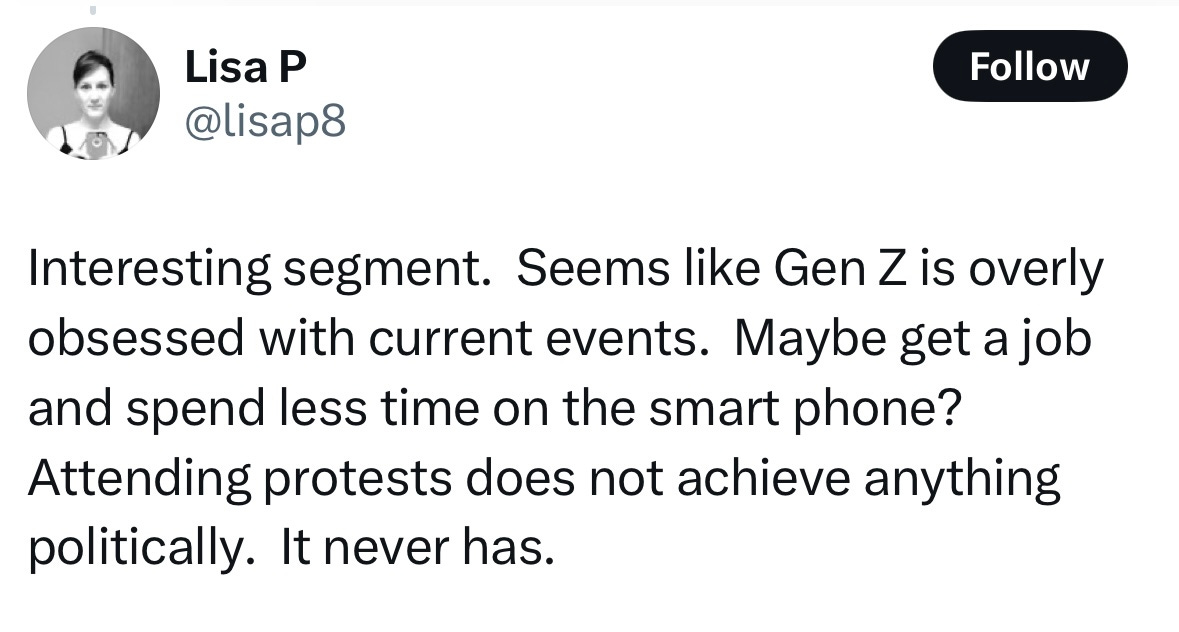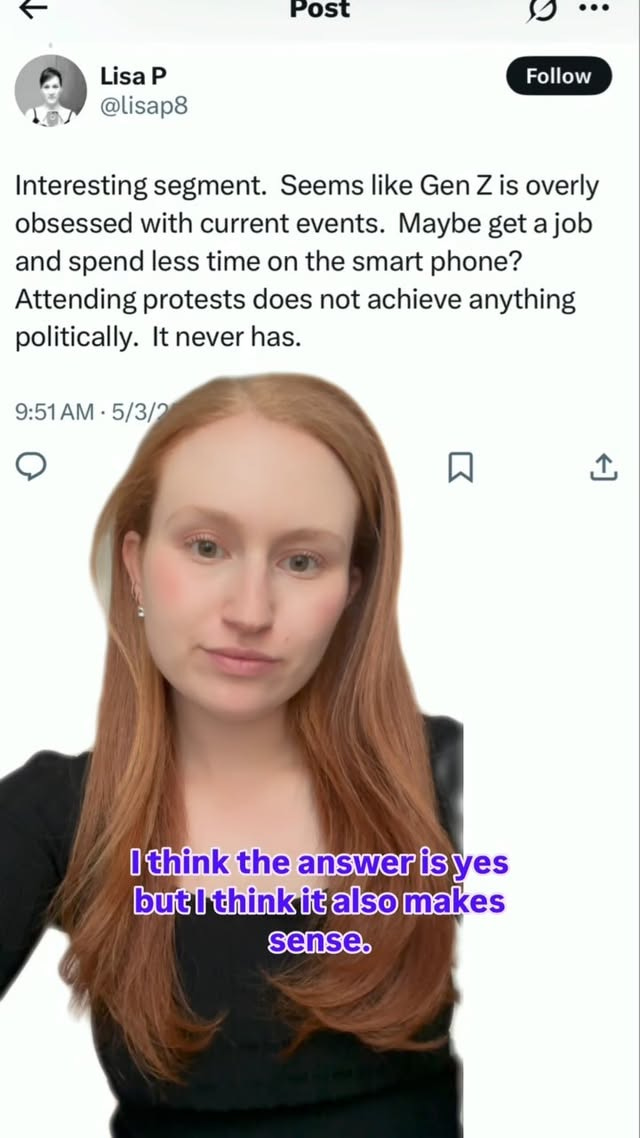Gen Z is the Current Events Generation
This generation is obsessed with current events. But it’s not just politics they’re watching.
Last week, after writing and talking about the difference in Gen Z 1.0 and Gen Z 2.0’s protest habits (or lack thereof), I received the following comment on X:
It begs one big question: Is Gen Z overly obsessed with current events?
The answer is yes. As the first digital native generation, raised amid constant crisis and the hyper-politicization of everything, we don’t just witness current events through our phone screens. Because of social media’s network effect, we’re able to have in-real-time dialogue with our peers about what’s going on, and how we feel about it.
So it just makes sense. Gen Z is the Current Events Generation.
When I first started The Up and Up in September 2022, I wrote the following about the lifespan of Gen Z:
Born right before or just after 9/11, Gen Z came of age during a period of crises: a 20-year war, Hurricane Katrina, the 2008 financial crisis, school shootings, mass shootings, climate change, COVID-19, and movements such as Black Lives Matter. This is a generation that grew up on social media and started paying attention to politics during the Trump era and in its wake, a time of hyper-polarization through which the line between politician and celebrity blurred and a series of policies – many to the chagrin of this voting bloc – was enacted quickly with the strike of a pen.
Fast forward to today, and these dynamics have been kicked up a notch.
The 2024 presidential election cycle was historic - featuring an attempted assassination and a candidate swap a little more than 100 days before the election. The Trump 2.0 era has ushered in a new wave of politics, defined by Elon Musk and DOGE, tariffs, and economic uncertainty. There are wars abroad – between Ukraine and Russia, Israel and Hamas – documented in-real-time on TikTok for young people around the world to see and opine on, or protest against. And as for tech, Chat GPT and other generative AI tools are transforming education, entertainment, and the workforce. In many ways, Gen Zers are the guinea pigs, test cases for how to learn and communicate via this new technology.
That’s A LOT. And it’s our reality.
While young members of Gen Z are witnessing a different political climate than their older peers, and may be less quick to take to the streets to protest than their siblings, cousins, and friends were even just five years ago, they’re not tuning out altogether.
I’m hearing diminished interest in partisan politics but growing excitement about business, entertainment, innovation, and the opportunity economy.
Just moments ago, I wrapped up a conversation with a group of high schools. One young man told me he gets his news (on the tech industry and rising entrepreneurs specifically) directly from Chat GPT.
The takeaway: Yes, Gen Z has been conditioned into an obsession with current events, but that looks different for different young people. Some may be into politics and global affairs, sure. But others are tapped into made-for-social content on sports, tech, or innovation. Every young person is consuming something, but their media diets vary based on their interests.
New Washington Post Op-Ed: You can’t buy your way to babies
The Harvard IOP Youth Poll released last month shows that just 48% of Americans under 30 say having kids is important to them.
That shocking statistic comes as President Donald Trump and The White House are hearing proposals for how to boost declining birth rates in the U.S.
One idea on the horizon is giving new moms $5,000 cash incentives…
In my latest op-ed for The Washington Post, I explore the growing disconnect between political efforts to reverse declining U.S. birth rates and the reality of what young Americans actually want.
Through interviews with Gen Z peers and a deep dive into recent data, I’ve found that the hesitation isn’t just economic. It’s cultural. Here is a gift link so you can read the full piece.
The tl;dr: If we're serious about changing the trajectory of America's birth rate, we need more than policy. It's going to take cross-partisan and cross-gender conversations rooted in empathy and respect.
Noteworthy reads
Forget Ferraris and Chanel—wealthy Gen Zers are splashing out on kombucha and spin classes instead, Emma Burleigh for FORTUNE
Millennials are doling out recession survival tips to clueless Gen Z: ‘We don’t panic … We prepare’, Brooke Steinberg for The New York Post
Inside the Trump Slump: Young, Latino and Independent Voters Sour on Trump, Carrie Dann for Cook Political Report
Young Catholic influencers are bringing MAGA to the masses, Jennifer Gerson and Mariel Padilla for The 19th*





This is going to give me nightmares: "One young man told me he gets his news (on the tech industry and rising entrepreneurs specifically) directly from Chat GPT."
ChatGPT is not a journalist. It does not do research, interview sources, or witness events. It does two things: 1) scrapes its information from other sources--which may be firsthand, or may be twentieth-hand, and may incorporate all sorts of biases--and 2) sometimes it "hallucinates," inventing things that never happened and presenting them as facts. It should never be used as a sole news source.
"Attending protests does not achieve anything politically. It never has." The author of this comment should go back and begin to understand the history of the labor movement, and more recently of the Civil Rights and antiwar (Vietnam) movemenets. And then acknowledge that she should rethink her statement.